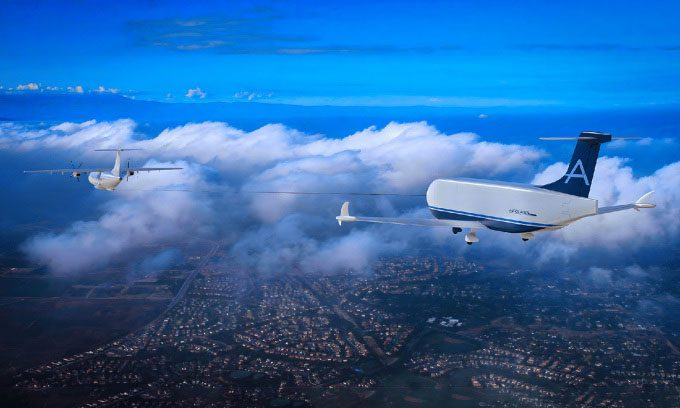A U.S. startup has developed a cargo transportation system that combines an aircraft towing a glider carrying cargo behind it via a tether, significantly reducing shipping costs.
Aerolane, a Texas-based startup, has discovered a method that can reduce air cargo shipping costs by up to 65%, according to a report by New Atlas on March 18. The company plans to use airplanes to tow automated cargo gliders behind them. This way, the aircraft can carry double or triple the normal cargo load.

The towing glider system significantly reduces air cargo shipping costs. (Photo: Aerolane).
The new system is inspired by gliders used to transport soldiers and equipment during World War II. Aerolane states that the automated cargo glider named Aerocart connects to the aircraft with a simple towing line. The glider does not have a propulsion system, which eliminates the entire weight of engines, fuel, or batteries. This vehicle also lacks a cockpit for a pilot and only has space for cargo and an automated flight control system.
The Aerocart will be towed by the aircraft along the runway. It takes off with the plane, then connects via a tether throughout the journey, automatically gliding behind to maintain minimal drag and maximum lift. It will land just behind the aircraft while still connected or disconnect at a suitable location to land independently on an entirely different runway.
Aerolane has been testing two prototypes of the glider since 2022. Both utilize Aerolane’s automated steering system, designed specifically to glide efficiently behind the aircraft. They are still equipped with engines, but Aerolane is working with the Federal Aviation Administration (FAA) to obtain approval for manufacturing aircraft without a propulsion system, using lightweight materials. The company aims to create a 3-ton cargo glider, followed by a 10-ton version.
Although there have been no early customers yet, Aerolane has secured approximately $11.5 million in investments and aims to provide services by 2025. As the prototypes reach compliance standards, the company’s concept of “air speed at ground cost” could attract significant interest from cargo shipping companies.


















































